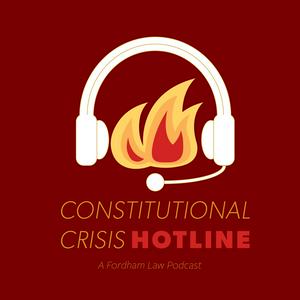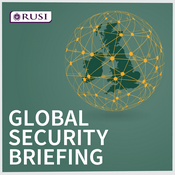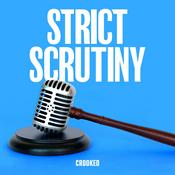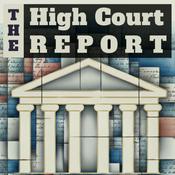17 episodios

Supreme Court Roundup
27/7/2023 | 53 min
Fordham Law professors Tracy Higgins, Abner Greene, and Ethan Leib join Julie Suk on the Constitutional Crisis Hotline to analyze the major cases of the Supreme Court Term that just ended, and then debate about the public criticisms of the Court’s legitimacy.In the last few weeks, the Supreme Court struck down race-based affirmative action programs, calling into question whether institutions can promote diversity in race conscious ways. It protected the free expression of a Christian website designer who opposes same-sex marriage against a Colorado law that would require her to offer her services to same-sex couples. The Court also struck down President Biden's effort to forgive student loan debt during the pandemic. Is the Court redefining the policy landscape on a broad range of socially divisive issues? Do these decisions--taken together with its decisions last Term on abortion and guns--call the Court's legitimacy into question? What are we talking about when we question the Court's legitimacy anyway? And what cases should we look out for this coming Fall?Recent decisions discussed:Students for Fair Admissions v. Harvard UniversityAllen v. Milligan303 Creative v. ElenisSackett v. EPABiden v. Nebraska Upcoming cases to watch:U.S. v. RahimiNetchoice v. Paxton (if the Court decides to grant cert.)Alexander v. South CarolinaLoper Bright Enterprises v. Raimondo

Indicting Trump
26/6/2023 | 48 min
Corey Brettschneider is a visiting professor at Fordham Law School, where he has taught constitutional law courses for several years. He is also a Professor of Political Science at Brown University. He is the author of several books on constitutional law and political theory, and editor of the Penguin Liberty series--a collection of historical, political and legal classics that speak to modern issues of liberty and constitutional rights. Brettschneider is also a frequent commentator in the media since the Trump presidency on the presidency and the Constitution, including the law and politics of prosecuting and suing a president.Read the book The Oath and the Office: A Guide to the Constitution for Future Presidents.Read his 2018 Washington Post piece in on the law of indicting presidents.Read his 2019 New York Times piece on the law of presidential immunity.

After Misogyny: Can constitutional democracies get past male overempowerment?
11/4/2023 | 41 min
Constitutional Crisis Hotline co-host Julie Suk argues in a new book that misogyny is the overempowerment of men and the collective overentitlement of society to women’s forbearance, pain, and sacrifices for the common good. Misogyny not woman-hatred alone; it is the legal structure that enables that hatred and extracts benefits to society at women’s expense. In this conversation, occurring in the moment that Donald Trump was finally indicted for concealing his hush-money payments to a porn actress, and a federal judge in Texas invalidated abortion pills, Deb Tuerkheimer and Julie Suk explore how this reframing of misogyny sheds light on abortion bans, and how women in U.S. history and around the world today have sought constitutional changes to reset male entitlement and power. Deborah Tuerkheimer Class of 1967 James B. Haddad Professor of Law at the Northwestern University Pritzker School of Law. Professor Tuerkeheimer is a former prosecutor and leading expert on the law of sexual assault. She is the author of the landmark book Credible: Why We Doubt Accusers and Protect Abusers (2021) and co-author of the textbook Feminist Jurisprudence: Cases and Materials. Read Julie C. Suk’s book, After Misogyny: How the Law Fails Women and What to Do about It (2023).

Re-Constructing Basic Liberties
30/3/2023 | 46 min
What is the future of constitutional rights protections and equal citizenship in our constitutional democracy? Is substantive due process over after Dobbs, or can we reconstruct it? We talk with Jim Fleming (Boston University School of Law, JD/PhD) about his recent book, “Constructing Basic Liberties: A Defense of Substantive Due Process” (2022), in conversation with Ken Kersch (Boston College, Political Science, JD/PhD), an expert on conservative political and legal thought, and working on a new book "The Right Rights: The Conservative Encounter with Civil Rights and Civil Liberties, 1954-1980."

Stayin' Alive: The 1970s Equal Rights Amendment Returns to Congress
20/3/2023 | 48 min
Is the Equal Rights Amendment (ERA) dead or alive? The Senate Judiciary Committee held a hearing at the end of February to consider a resolution that would recognize some state ratifications of the ERA that were completed decades after Congress’s deadline. Originally proposed in 1923 and adopted by Congress in 1972, the ERA would add a sex equality guarantee to the U.S. Constitution. Does Congress have constitutional power to remove the ratification deadline? What should it do about the states that tried to rescind their ratifications? And what difference does the Supreme Court’s decision in Dobbs make to the future of women’s constitutional rights?Kathleen Sullivan testified at the Senate Judiciary Committee hearing on the ERA on February 28, 2023, in addition to the House Judiciary Subcommittee hearing on the same subject in 2019. Sullivan is the former dean and professor of law at Stanford Law School, and currently senior counsel at Quinn Emanuel. She is the co-author of a leading constitutional law textbook and dozens of law review articles including, most relevant to this episode, “Constitutional Constancy: Why Congress Should Cure Itself of Amendment Fever” (1996) and “Constitutionalizing Women’s Equality” (2022).Jesse Wegman authored an op-ed in the New York Times,, “Why Can’t We Make Women’s Equality the Law of the Land?” (2022). Wegman is a member of the New York Times editorial board, and teaches courses at NYU School of Law. He has written on a range of legal and political issues for the New York Times. He is the author of a 2020 book, Let the People Pick the President: The Case for Abolishing the Electoral College.Read Constitutional Crisis Hotline co-host Julie C. Suk’s 2020 book about the ERA, We the Women: The Unstoppable Mothers of the Equal Rights Amendment .Read Kathleen Sullivan’s written testimony for the Senate Judiciary Committee Hearing on the ERARead Jesse Wegman’s Why Can’t We Make Women’s Equality the Law of the Land? N.Y. Times, 1/28/2022.Watch the Senate Judiciary Committee Hearing on the ERA, Feb. 28, 2023.S.J. Res. 4- A joint resolution removing the deadline for the ratification of the Equal Rights Amendment.
Más podcasts de Gobierno
Podcasts a la moda de Gobierno
Acerca de Constitutional Crisis Hotline
Escucha Constitutional Crisis Hotline, La Ingobernable. Un podcast sobre Marca España y muchos más podcasts de todo el mundo con la aplicación de radio.es

Descarga la app gratuita: radio.es
- Añadir radios y podcasts a favoritos
- Transmisión por Wi-Fi y Bluetooth
- Carplay & Android Auto compatible
- Muchas otras funciones de la app
Descarga la app gratuita: radio.es
- Añadir radios y podcasts a favoritos
- Transmisión por Wi-Fi y Bluetooth
- Carplay & Android Auto compatible
- Muchas otras funciones de la app


Constitutional Crisis Hotline
Descarga la app,
Escucha.
































